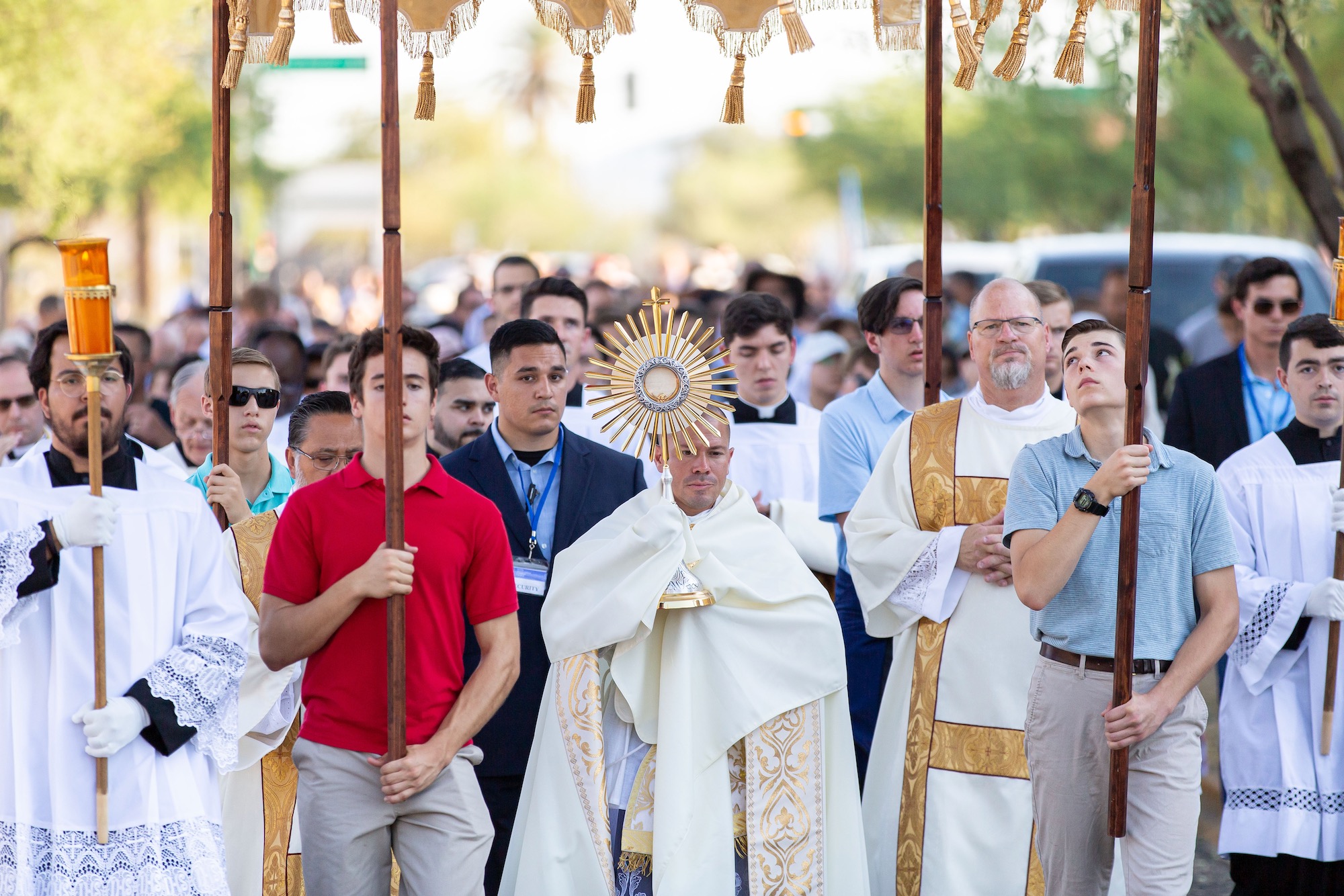In recent weeks and months, the phrase “eucharistic coherence” or “eucharistic consistency” has risen almost to common parlance in Catholic circles and in Catholic media. The phrase has most frequently been connected to a forthcoming document — recently approved for drafting by 75% of the U.S. bishops — centered on “the meaning of the Eucharist in the life of the church.”
The outline of the document, as presented by Bishop Kevin C. Rhoades of Fort Wayne-South Bend, Indiana, chair of the U.S. Conference of Catholic Bishops’ Committee on Doctrine (and, full disclosure, chair of the OSV board of directors), includes the “fundamental truths” of what the church teaches on the Eucharist, the “need to celebrate the sacrament with reverence and beauty,” and how participation in the Eucharist “compels us to conversion and sends us out to be missionary disciples.”
This third point has, strangely, been the cause of much consternation almost from the first moments of the bishops’ June 16-18 gathering — not to mention for months ahead of time — because it will include a section on “eucharistic consistency.”
It’s hard to comprehend that a group of leaders within the Catholic Church — even a minority group — would launch such a strong objection to emphasizing that Catholics should strive to live what they believe. Yet this is what has happened.
Though it has its foundation in canons 915 and 916 of the Code of Canon Law, the phrase “eucharistic consistency” can best be traced back to the 2005 Synod of Bishops on the Eucharist, a gathering that closed out the Year of the Eucharist initiated by St. John Paul II in 2004.
As part of the usual synod process, a “lineamenta,” or outline, was compiled — a document that encourages the input of all Catholics regarding the topic at hand. Through that feedback, the synod fathers gleaned several key takeaways, which were described in the synod’s working document as “indications of deep-rooted attitudes.”
These attitudes included a sense that Mass participation on Sundays and holy days of obligation was decreasing “due to a lack of understanding on the content and meaning of the eucharistic mystery and to an attitude of indifference.”
They also indicated that “a sense of the sacred” regarding the Eucharist has been weakened due to a “neglect of prayer, contemplation and adoration of the eucharistic mystery” — all of which threatens faith in Jesus’ real presence.
And, significantly for the current conversation, the feedback pointed to the reality that “people are not always consistent in the faith they profess in the sacrament and the moral implications of the sacrament in both personal matters as well as in the general cultural and social arena.”
In his postsynodal apostolic exhortation “Sacramentum Caritatis,” (“The Sacrament of Charity”), published a year and a half after the synod on the Eucharist, Pope Benedict XVI expanded on that problem of eucharistic consistency, specifically in light of those people who occupy roles of influence.
“Worship pleasing to God can never be a purely private matter, without consequences for our relationships with others: It demands a public witness to our faith,” he wrote.
“Evidently, this is true for all the baptized, yet it is especially incumbent upon those who, by virtue of their social or political position, must make decisions regarding fundamental values, such as respect for human life, its defense from conception to natural death, the family built upon marriage between a man and a woman, the freedom to educate one’s children and the promotion of the common good in all its forms. These values are not negotiable.”
In its attempt to draft a statement on the Eucharist, including a section on eucharistic consistency, the doctrine committee has been accused of targeting Catholic U.S. President Joe Biden in order to justify denying him holy Communion. But such a statement can only serve to reiterate church teaching — not invent it.
As with any other organization, it is the teaching and the expectation of the church that those who profess to be her members live according to her beliefs in a consistent manner. When we inevitably fail, the sacrament of reconciliation is there to return us to a state of grace and assist us “to sin no more and to avoid whatever leads (us) to sin.”
There is an expectation that we be willing to amend our behavior and strive to live in accordance with what the church teaches. This seems a reasonable expectation. And it’s absolutely essential, as Father Harrison Ayre recently wrote, in order to preserve the unity of the church and to advance her mission in the world.
There are those who claim that to follow or to enforce this discipline of the church is to make a weapon of the Eucharist. But the Eucharist is not a weapon. It is a gift freely given to us by our loving and merciful God, and we receive it on his terms, not our own.
Though we are never truly worthy of receiving it, the church teaches that we are at the very least to make sure that we are properly disposed to do so. Only in this way can we truly, and correctly, live what we believe. What is there to fear about that?







